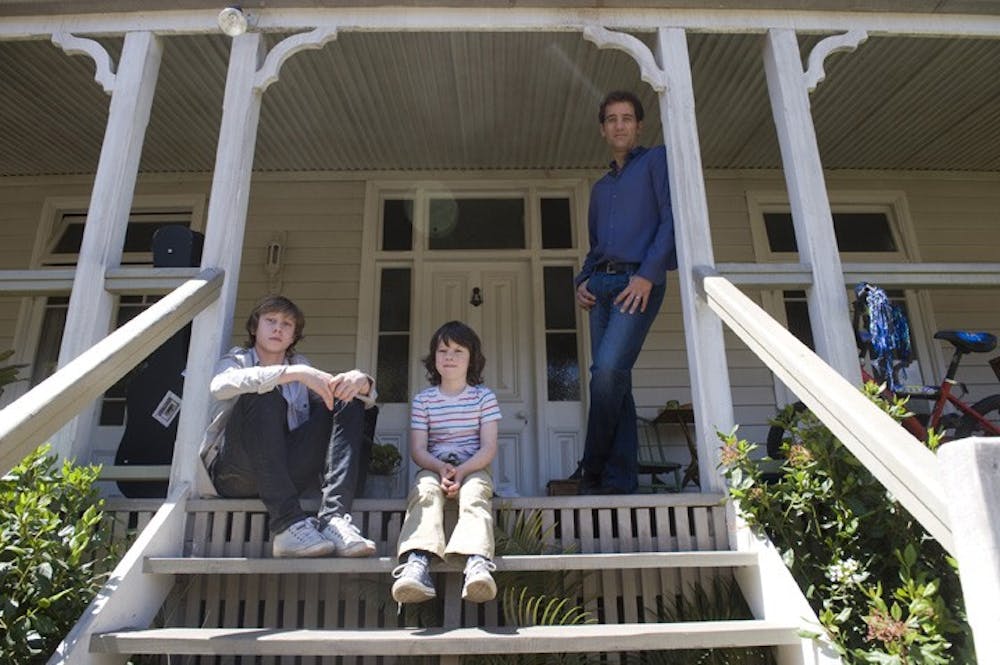The Boys Are Back GRADE: B+
Director Scott Hicks, best known for “Shine,” now brings us “The Boys Are Back,” a study of the bittersweet time that follows the passing of a beloved spouse. “The Boys Are Back” manages to incorporate beauty with death and finally results in hope of new growth. The film is based on the memoir of the same name by Simon Carr.
Set in beautiful southern Australia, Clive Owen plays Joe Carr, a British sports journalist who follows his wife Katy (Laura Fraser) to the country, leaving behind his ex-wife and a son. Katy and Joe are parents to six-year-old Artie (Nicholas McAnulty). Once Katy dies of cancer, Joe begins to shoulder his responsibility as the sole parent, rejecting the suggested structure of his mother-in-law, Barbara (Julia Blake). Instead, Joe allows Artie to zip line across the yard and leave dirty plates throughout the house.
Written in magnetized, colored plastic letters on the refrigerator is the mantra that governs the men’s motherless existence: “Just say yes.” This pithy motto is first glimpsed beneath the avalanche of clutter that fills their rustic Australian home. The film is about Joe’s struggle to admit that Artie needs more than a “pressie giver” for a father. Completely alone in raising his child, Joe fails several times before he advances; for example, he leaves the crust on Artie’s toast, rendering it inedible. His “yes” answer to Artie in almost every situation is an impulse that keeps the two from confrontation.
Joe’s “say yes” attitude takes lax parenting to an extreme. He allows Artie to perch on the hood of his Range Rover as he drives down the beach and encourages water bomb fights in the house. In large part, Carr’s lazy parenting style is a reaction to the deep loss that the two left behind are suffering as they skirt acknowledgement of Katy’s death. This reminds the viewer that grieving sometimes requires guidance; not all of us know how to heal in a pat, rapid way. Both boys have their escape; Joe settles into unresponsiveness while Artie makes a game of the situation, even gloating to his grandmother, “I told you Mommy would die last night.” Hicks cases the sadness through both Joe and Artie’s eyes, allowing the viewer to sympathize with both parties.
Slight order comes with the arrival of Laura (Emma Booth), the single mother of Artie’s classmate. She does the expected, taking the kids to school and taking care of the mess the boys have grown used to. She also does the expected of falling for Joe. The introduction of a single woman so soon is a technique we have seen before (think of Liam Neeson’s widower in “Love Actually”). The quick female fix is a device that weakens the story.
At this time of uncertainty comes a phone call from Joe’s teenage son from his previous marriage, Harry (George MacKay). Harry wants to live with his father for the summer, so Joe takes him in. Harry is a reminder of Joe’s past failures as a parent, just as Artie symbolizes Joe’s still unproven skills as a father. This film is a triple-level coming of age story: Artie adjusting to a motherless life, Harry learning to accept his father and Joe making sense of a life thrust upon him when he thought he could pick and choose his paths. Artie, a bubbly sprite of a child, takes an immediate liking to Harry. It is Harry who is reluctant to join the “Neverland” methods of Joe’s parenting. Eventually, Harry settles in the routine of big brother, though still with friction between him and his father.
Joe tailors his laissez-faire style to feed his children’s appetites, gaining allies along the way. By the end of the film, women, including classroom moms and mothers-in-law, become more accustomed to his ways. Joe’s shaggy parenting gradually endears him to females in the story, the point being that people can rebuild their lives in surprising ways when tragedy visits. Even tight-mouthed Barbara visits the boys more often in their shambled house.
Catching Australia’s beautiful horizons, Hicks balances the heavy idea of death with images of vineyards, beaches and sun-filled porches. The film advertises Australia as the perfect escape. Clive Owen delivers in his performance as a tortured father and writer. Usually seen as a gritty soldier of fortune or a tough guy, Owen is entirely credible as a beleaguered father pushed into building a better version of himself.
The film’s warming effect grows beyond condolences and taps into the infinite possibilities of summer, the many ways we hope to restore balance and love and sunshine in our sense of family.





